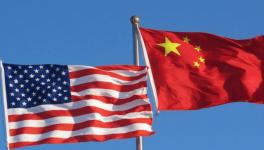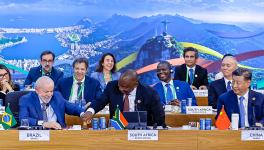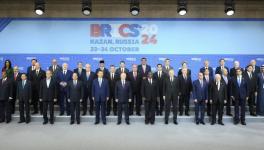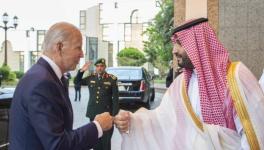BRAZIL: Towards a Right-wing Foreign Policy
As preparations begin for the 8th BRICS Summit in October 2016 hosted in Goa, India, NewsClick speaks with Brazilian Economist Adhemar Mineiro on foreign policy challenges under interim President Michel Temer.
Temer’s Foreign Minister Jose Serra has been quick in ensuring a sharp right turn in Brazil’s foreign policy. The right wing interim Government which has no popular mandate is actively considering deeper engagement with the US and EU and breaking ranks with developing countries at the WTO. Its approach towards BRICS and south-south cooperation is yet unclear.
For the first part of the interview with Adhemar Mineiro on the economic and political impasse in Brazil see: http://newsclick.in/brazil-state-economic-and-political-paralysis
Rough Transcript
Prabir Purkayastha (Prabir): In this segment, we will talk about the impact of the economic crisis and the impeachment of President Dilma on foreign policy and the external policy of Brazil. Brazil has been an important player and in fact, it was one of the leaders in setting up the IBSA first and then BRICS, it played a very important role in all of this. So how do you see Brazil's role in BRICS particularly with the crisis that is going on in Brazil now and with this political paralysis you have talked about?
Adhemar Mineiro (Adhemar): Some of the new issues on the diplomatic arena; BRICS or the former IBSA group but also UNASUR or CELAC related to all the Latin American countries and the Caribbean meaning all of America except US and Canada but including Cuba since the beginning. Those are some experiments from the time of Lula’s government and what was called some kind of new foreign policy from Brazil. This is hugely effected by the process, this impeachment process and one of the main changes, well the new Minister of Foreign Affairs of the interim government José Serra is the senator, disputed ( contested) two times in the last four elections for the Presidency by the main opposition party, BSDP which is the party of the former President Cardoso which is just before Lula and Serra disputed (contested) the first election against Lula and then also against Dilma and he is now the minister of foreign affairs and he wants to be candidate in the national election we have in two years. So he is at least in what related to a new kind of speech, he is trying to say we are under a new administration, we are changing our positions. We have nothing to do with the old positions. We want to align with the US, with the European Union, we want to be part of the Western hemisphere. We want to go to the trade treaties and if possible we want to join the TPP, we want to join every kind of agreement on the trade areas and he is not saying what does he want to do with process like BRICS. So this is a very big interrogation mark on the Brazilian scenario at this moment because at the last years China was also part of BRICS is the main investor in Brazil and is also the main trade partner. So just like he is saying I don't know what to do with the main economic partner at this moment. So the situation is like, my institution which is the Brazilian Network for the Integration of the Peoples (REBRIP) which follows the economic issues related to the foreign affairs in Brazil. We are just waiting what the new government will do about this area. But the general position is to follow the EU and the US on the positions on trade and everything. This for instance represented the problem inside WTO because last month there was the discussion inside the trade G-20, inside the WTO which includes all the BRICS countries and at this meeting, well, at the best Brazil traditionally negotiated a common position with India for instance at the issues on agriculture for instance, the discussion on the food stocks in India, all these represented for instance the Nairobi WTO meeting at the end of last year and so in this meeting one month ago in Geneva the WTO G-20 countries, Brazil was very far from the Indian position for instance just saying no question of exporting food products or not having some stocks on that. So if you don't have rice, you have to go to the international market. You can't subsidize, you can't have food stocks and Brazil stayed alone with Argentina and Paraguay on that position and all the other G-20 countries including China, including South Africa, including India but also including countries like Indonesia saying no, this is unbearable position we can't just think of food exports. We have our people who have to somehow manage things not to have shortage of food internally. There is a very complicated scenario in the international area we can’t remain depending on imports. So we can't have the same position on food. I think it was the first time that they could not arrange a common position somehow and this shows a little bit the new position of the Brazilian diplomacy with Serra heading the foreign affairs ministry. I am sure this will influence the BRICS process. So we have to see because on the other hand we have this problem that what to do with China because China is the main partner.
Prabir: It is interesting you talk about the WTO and Brazil in India because India and Brazil have a somewhat conflicting outlook on agriculture. Brazil exports a lot of agriculture while India is generally not either an exporter or an importer of agriculture goods. Though now, it is importing some and exporting some. So it is politically, that these two countries have actually come together. Otherwise, economic interests on agriculture have never been so close. As you have rightly said that this was always politically negotiated with India and Brazil. Even under Cardoso's time when Brazil and India were somewhat together on WTO and trade negotiations even in late 80s and 90s. So it is an interesting development if Brazil shifts completely out of this kind of position into a pro-US, pro-EU position on issues either in WTO or other economic issues.
Adhemar: Yes, because it also represents an internal move in the Brazilian position. Internally because during the Lula's period and also with Dilma's first term, the idea is that liberalization movement/moves in the trade negotiations including agriculture could influence the situation in Brazil because Brazil has some sectors that are very sensitive and defensive that are mainly in sectors of family farms. So liberalization in such areas like wine or milk or some specific products could affect directly the family farm production in Brazil. But Brazil internally has to conciliate somehow an offensive position of the big business in agriculture with some defensive positions of some family farms and this made it possible to have these negotiations with countries that have more defensive positions in other sectors. So Brazil had to make its own internal negotiation. Afterwards it was easier to negotiate with all the countries on the same defensive positions. But now, the government seems to have taken the position that we are not interested in family farm production. We just go for the interests of the big business in agriculture and food exporters all that and so this represents not only an internal rupture but also a breakdown in the international scenario related to trade and agriculture.
Prabir: Thank you very much Adhemar. It was a pleasure talking to you and hope we can meet up with you again in Newsclick. Thank you very much.
Get the latest reports & analysis with people's perspective on Protests, movements & deep analytical videos, discussions of the current affairs in your Telegram app. Subscribe to NewsClick's Telegram channel & get Real-Time updates on stories, as they get published on our website.
























